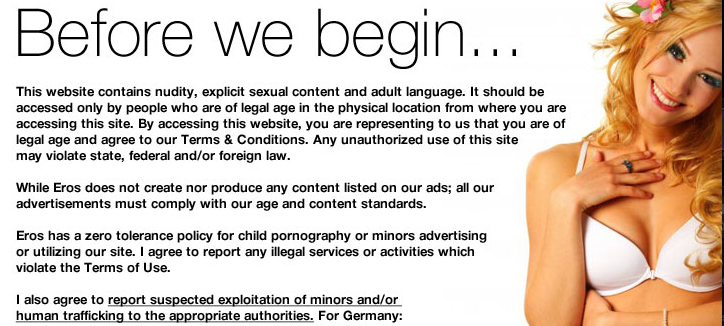
She makes a post at 3 p.m.
The description is vague, but accurate: Not a bombshell, white and a little bit chubby with a retro style and an artistic edge. She adds fun, cute and laid-back into the mix, supplementing the already cryptic hodgepodge of alluring adjectives that could easily describe any number of young, American women.
By 10 p.m., more than 100 responses litter her inbox. The selection process begins.
For Fiona, who chose not to reveal her real name, culling through her email is more of a deletion process than one of selection.
Poor spelling? Delete.
Rude? Delete.
Sexually explicit? Delete.
The slightest hint of a creepy vibe? Delete.
“I delete maybe, I don’t know, 90 to 95 percent of responses,” Fiona said. “I narrow it down to people I am interested in.”
Fiona isn’t filtering messages from men who saw her profile on OKCupid or Match.com. She isn’t interested in a relationship with any of the men cluttering her inbox — unless, of course, it’s a transactional relationship in the form of cold, hard cash.
In fact, this description isn’t even on a dating service’s website. It’s on Craigslist, in the personals section.
Fiona is in her 20s, lives in New York, received a bachelor’s degree from a four-year university and has since started a professional career as a freelance artist.
And she’s a sex worker on the side. A call girl to be specific.
“Call girl is horribly outdated,” Fiona said with a snort. “Email girl. Ha!”
A sex worker is someone who works in the sex industry. This definition is broad and includes many fields such as prostitution, call girl or escort services, pornography and erotic dancing such as strip tease or burlesque.
The media has produced countless images of this line of work, ranging from the hooker-with-a-heart-of-gold caricatures like Julia Roberts in “Pretty Woman,” to the far more common depiction of a victim of abuse and desperation like in the television program “Law and Order: SVU.”
Whether women in the sex industry are wearing pearls or an ill-fitted tube top, sex work is a controversial topic, and it’s dividing feminists and human rights advocates alike.
This is Fiona’s story.
The Start
Fiona’s journey into sex work began with a blog. One summer when she was an undergraduate, Fiona began reading the blog of a woman who was a call girl in college. She also had an acquaintance who did sex work while working in academia.
“I became sort of aware that sex work wasn’t just something that broken, messed-up criminals do,” Fiona said. “My assumptions about what sex work is and what kind of people do it — from a lifetime of media stereotyping — sort of abruptly disappeared.”
The idea piqued her curiosity. She weighed the risks against the advantages and realized that sex work was something she could do.
From then on, she became an independent sex worker, a call girl, who found clients via Craigslist.
The frequency of her encounters with clients is inconsistent. Fiona focuses on her primary career. When she’s a call girl, she makes her own hours and decides if and when she is in the mood for working. But her dependency on sex work to supplement her income depends on the month. When she isn’t working in freelance art, she depends on sex work to help pay the bills.
The Client
Fiona is very selective.
“What I am looking for is, specifically, an older, divorced or single person with a lot of cash to throw around,” Fiona said. “[They’ll] be a little bit nerdy and not looking for, like, porn-star olympics — just some laid-back and affectionate fun.”
Fiona stressed the importance of a potential client’s email in determining what he is like. Writing style is a clear indicator of a client’s personality and what he will expect from a scheduled meeting.
“My ideal email respondent is frank, casual, forthcoming about himself and his personal details, and isn’t looking for X amount of porn-star sexual activity for the least money possible,” Fiona said. “[He] is lonesome and looking for a bit of low-key company with someone young and smart and exciting and interesting.”
After filtering the emails, Fiona narrows down the prospective clients. Out of the more than 100 responses she receives, she corresponds with only five or eight, and actually meets up with about three. Fiona doesn’t take ethnicity into account when looking through her prospective clientele, but the men she meets are usually white or East and South Asian men, are in their 30s and live in upscale neighborhoods. Sometimes they meet in public first, but she visits only the homes of clients who have a doorman on duty.
For Fiona, the sessions are easier and safer than meeting someone at a bar.
“There are 4 million men in New York City,” Fiona said. “It is a risk, but the stereotypes about prostitution exaggerate those risks. It’s also risky to meet people in any way.”
Safe sex is required.
“I protect myself by using condoms every time, for everything. I am very aware of my sexual health.”
Fiona gets tested for sexually transmitted diseases frequently and examines herself everyday after showering to make sure there are no visible changes.
Still, she see’s little point in asking her clients if they have been tested for STDs. But she doesn’t find clients any more or less devious in that regard than anyone else.
“People lie and people are ignorant, and I’m aware that there is no way of knowing whether it’s lying or ignorance,” Fiona said. “Until a person gets tested and is monogamous with me, I assume they are a carrier for everything, no matter who they are.”
The Tryst
“I come to their door, chitchat, f—, chitchat, leave,” Fiona said. “It is exactly like a booty call date, minus all of the texting drama. Plus cash.”
Fiona’s casual, humorous summation of the sessions highlights the level of comfort she has in her work. She has yet to have a bad experience with a client, and a fair amount of their time is spent chatting and sharing mutual interests.
Her customers aren’t only paying for sex. Yes, they are paying for her to show up and look nice, but according to Fiona entertaining conversation is part of the package as well.
Fiona recalled a funny moment when she and her client had a serious, fannish discussion about a television program that they’re both obsessed with. Moments like this have taught Fiona that these clients are more than just men with sex drives: They’re individuals who have hobbies, careers and outside interests. It’s all a learning experience for Fiona, who now knows that there isn’t only one type of person who sells or buys sex.
The relationship between Fiona and her clients is comparable to the friendship one develops with a hair stylist: Friendly, but professional.
“You share interests. You talk. It’s nice,” Fiona said. “But it is a client-based relationship, still. There are boundaries. You don’t bring baggage to your clients. You keep it friendly and light.”
Sex work is similar to service industries, Fiona explained. Someone requests a service, another performs the service, and they exchange goods to complete the service. So she considers sex work, at its most basic level, in the same league waiting tables or working retail. And like other service workers, Fiona has a role to play and it can be emotionally exhausting. She has to interact with people and anticipate their wants and needs.
The Stigma
So why, then, is it unlikely that the average person could fathom comparing sex work to a pedicure? In Fiona’s opinion, it is all about stigma.
“I think why people call it ‘selling yourself’ is because there is a really nasty conflation of sex and ownership,” Fiona said.
“You don’t consider someone ‘selling themselves,’ because they do a stranger’s nails all day long. Or because they, I don’t know, cut hair or do acupuncture. Or squeeze someone’s back acne for them,” said Fiona, adding, “that’s a job, by the way. People who do facial in spas squeeze people’s back acne for them.”
Fiona would happily join a local, organized sex workers rights group, but she keeps that side of her life under wraps.
“The stigma is very real and ridiculous,” she said. She attributes all of the anxiety and worry she has about her participation in the industry to this stigma.
“It’s not, ‘Will this client kill me like on Dexter?’ It’s, ‘What if someone sends my mother an email outing me?’ Or, like, ‘What if someday I’m unable to get a job I want because people see me as less of a person, or as part of some automatic underclass?’”
For these reasons, Fiona is afraid to “flag wave.”
The Advocacy
Despite stigmatization, independent sex workers are gaining more of a voice.
Amanda Brooks, an escort and sex work advocate, is the author of a two-book series called “The Internet Escort’s Handbook.” The first book details the foundation of becoming involved in the escort industry, highlighting safety and physical and emotional health. The second focuses on advertising and marketing.
The microblogging website Tumblr hosts a blog titled Sex Worker Problems. The blog is updated regularly with user-submitted content from a wide range of sex workers, including strippers and those who perform sexual acts on webcams.
Sex Worker Problems chronicles the mundane (“Laundry: You’re never done washing sexy clothes, underwear, bedding”), the serious (“Constantly fighting for labor rights, fair working conditions, and our health and safety”), and the perks (“Developing the most amazing people skills, even if you’re not a people person”).
On the legal end, Sex Workers Project provides legal services, legal training and advocacy. The New York-based organization, a subsidiary of the Urban Justice Center, helps those who are in the sex work industry by “choice, circumstance and coercion.”
A San Francisco-based facility by the name of St. James Infirmary offers free, nonjudgmental medical services for past and present sex workers of all genders and sexual orientations.
Despite increased vocalization of sex workers, the vast spectrum of sex work is still treated with derision or characterized by static media stereotypes. Nevada is the only state in the United States where prostitution is legal and government regulated. Since 1997, strippers working in a San Francisco peep show known as the Lusty Lady remain the only unionized strippers in the country.
In recent years, NGOs and government entities have increased awareness of sex trafficking with initiatives, but they have conflated it with sex work and the sex industry as a whole. For example, a 2011 fact sheet from the U.S. Department of State titled “Prevention: Fighting Sex Trafficking by Curbing Demand for Prostitution” used terms such as sexual slavery and commercial sex in an undifferentiated tone.
These documents bring light to the seriousness of sex trafficking. But they also place Fiona in the same category as a woman whose sex work is marked by forced transport and/or coercion, violence and manipulation.
Fiona acknowledges the dark elements of the sex industry and actively opposes pimping. In her opinion, prostitution must be legalized and regulated so that the safety and rights of sex workers can be protected.
“Illegality makes things inherently unsafe,” Fiona said. “A safer industry is a legalized industry.”
Fiona doesn’t want to be characterized as broken and looking to be rescued because she is in the sex industry. Nor does she want to be seen as lacking self-respect. But she knows that she is privileged in her field of sex work. She is white, she is college educated and she has the ability to stop whenever she wants to, unlike those who are forced to perform against their will. As a call girl, she isn’t a vulnerable as street-based prostitutes who, according to the Sex Workers Project, are the most susceptible to violence and arrest.
“I don’t feel like it’s appropriate to speak about sex work in a monolith, because it isn’t a monolith,” Fiona said. “It’s a pyramid, and I am nearer to the top than most folks.”
“I have no place talking about sex-positive feminism in the same conversation that’s about trafficking and monetized rape.”
The Plan
Fiona is interested in stepping up her game.
“I’m a friendly, freelance weirdo right now,” Fiona said, “but high-end escorts make absurd bank.”
Bank is right. Fiona directed me to the website of a successful woman whose escort service rates start at $1,500 for two hours with a casual acquaintance. For strangers, a four-hour lunch or dinner date costs $2,500, a 14-hour overnight or full-day date is $5,000. A 24-hour date is $7,000. The dates must include fun outings such as dining, going to a museum, attending a show or even bowling.
Fiona looked at the rates and joked: “I am in the wrong business. Why did I major in [the arts]?”
But making it big takes a lot of work, especially when it comes to image.
“I have to correspond more closely to the commonly held beauty standard,” Fiona said, with a hint of disappointment. She added that she’ll likely spend the next few months losing weight and developing a business plan. She will also have to get professional photos taken, start a website and pay taxes. However, the increased revenue is exciting. The extra money can be used for her primary career in art and will help her save up for retirement.
Fiona is excited about little things, too, such as choosing a new pseudonym. She’s going for something enticing without sounding too silly, a task she finds fun but difficult.
When asked about how much the Internet has aided independence in the escort industry, Fiona’s response was firm.
“Aided isn’t a strong enough word,” she responded.
Indeed, the Internet has created a new world of escort entrepreneurship, including advertising and blogging. For example, Eros Guide is a site in which people can advertise erotic services with an accompanying profile complete with photos and rates.
Many independent, Internet-based escorts are as serious about their business as any other entrepreneur.
For example, on the website of an escort in her 20s, the FAQ section addresses a common gripe: Why are her rates non-negotiable? The escort’s reply is frank: “Will a salesman allow you to negotiate the rate of his Maserati as the same rate of a Toyota because that’s what you want to pay? No. So the same goes for my rate.”
“There’s so much, like, individual entrepreneurship. Before the Internet, that really wasn’t possible,” Fiona said. “For young women—without sex work connections to go into businesses for themselves—they worked with agencies exclusively, some of which were good; some financially exploitative.”
The Future
Fiona prefers to talk about her sex work in broad terms. She is interested in advocacy, addressing stigmatization, social repercussions, and political and gender ramifications.
But individual details — like what she mentions in her ads, what she wears, email correspondence, what happens during a session —
“That starts to feel oddly like sex work, you know?”
Fiona churned over her words for a moment before explaining herself.
“When people get curious and sort of pepper me with questions about my clients and my encounters with them, I sort of feel like they become a client, because what I’m doing then is satisfying, I don’t know, this odd, lurid curiosity,” Fiona said. “There are expectations there and assumptions that people are hoping to be satisfied. And I become this other person to them, sort of ‘Exciting Sex Worker That I Know.’
“It feels a lot like working. People’s natural curiosity puts them on almost, I don’t now, a consumer level. And it’s not that different from sex work itself, because you’re playing a part for them, too.”
Very few people know about Fiona’s job as a call girl, including her mother. If her business as call girl grows, then she will consider telling her mother. But for now, the less Mom knows, the better.
“But to be fair,” Fiona explained, “I don’t tell my mom about any of my sexual experiences, or how I meet the people I have sex with. I don’t get her on the phone and say, ‘Hey Mom did you know I had my first threesome? It went well.'”
Fiona knows that she will not be interested in sex work forever, but for now she is far from burnt out. She finds sex work fulfilling and positive.
As for romance, Fiona is single and suspects that she’ll be in a monogamous relationship in the future. But she’ll cross that bridge when she comes to it.
“If a potential partner thinks that my past sexual history is any of their business, then I wouldn’t want him or her anyway,” Fiona said. “And really, relationships are unique, and people are unique. I am planning to play it by ear










Recent Comments